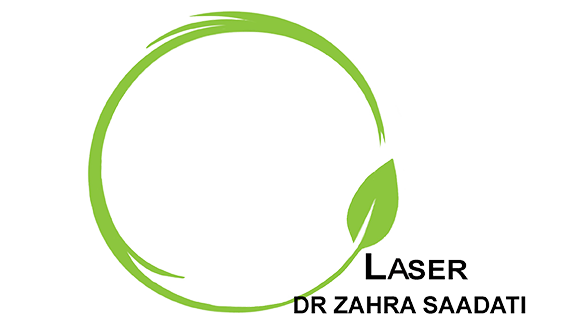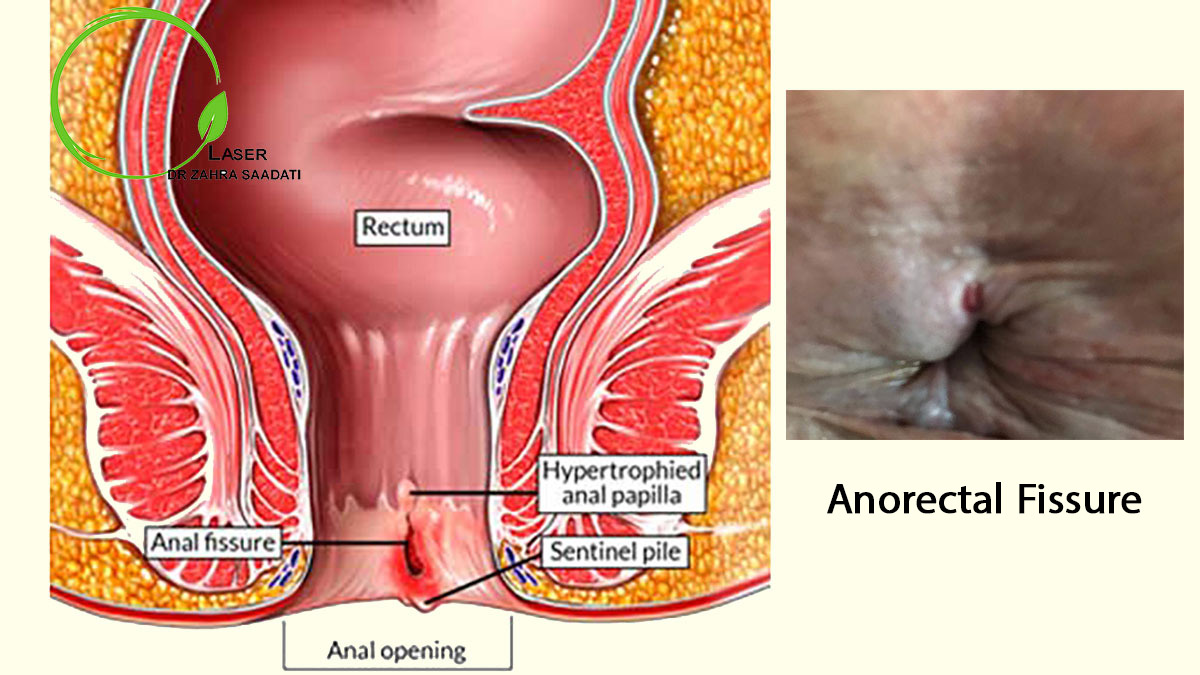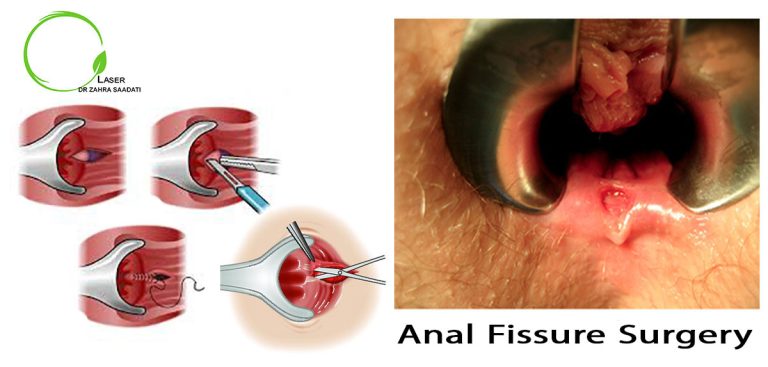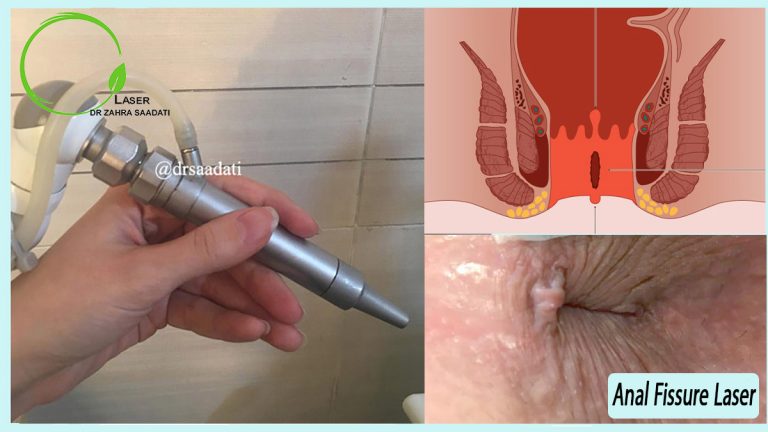An anal fissure is a tear or open sore that develops in the lining of the large intestine, near the anus. Some patients call fissures an anal tear and complain of pain and irritation in the area. Various reasons can cause this disease in the epithelial layer, which leads to severe pain, bleeding, and irritation.
Today, many individuals may suffer from a fissure. The main factors causing an anal fissure are as follows:
- Long-term diarrhea: in patients with inflammatory bowel diseases such as ulcerative colitis and Crohn’s disease.
- Constipation: excessive increase in intra-abdominal pressure during defecation. Hard stool usually imposes pressure on the anus and anal muscles. As a result, the reduced blood supply to the anus over time tightens the anal muscles and increases the risk of ruptures.
- Underlying diseases such as AIDS, anal cancer, tuberculosis, and anal trauma
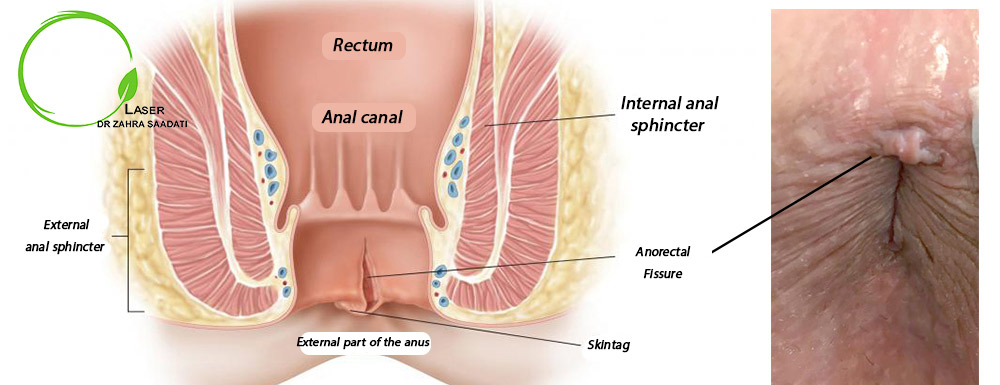
What are the symptoms of anal fissure?
Note that the symptoms of an anal fissure are highly recurrent. An anal fissure may be characterized by one or all of the following symptoms:
- Bleeding from the anus, especially during or after defecation
- Feeling a sharp pain
- Itching in the area around the anus
- Noticing a skin tag around the anus
- Anal pain when coughing or urinating
Patients with anal tissue disorders are at greater risk for developing an anal fissure. Studies by physicians show that most patients with an anal fissure suffer from at least one underlying disease of the anal tissue.
One of the common underlying disorders of the anal area is the abnormal enlargement of anal muscles, which imposes extra pressure on the anus even when the anal muscles are at rest. In fact, most patients with an anal fissure always feel this extra pressure even when the anal muscles are at rest. Because of its sensitivity and weakness, the midline of the back wall of the anal canal is more vulnerable to anal fissures.
Types of anal fissures
There are two types of anal fissures: chronic and acute. An anal fissure is called acute when it has recently occurred. This type of anal fissures can be treated through changes in diet and medication. When symptoms of an acute anal fissure last 6 to 8 weeks, it is called a chronic anal fissure. This type of anal fissures usually causes skin tags around the anus. A chronic anal fissure does not respond to medication and home remedies. In such cases, patients are recommended to visit an experienced and proficient general surgeon and laser surgery specialist to remove the skin tags using a high-power laser. Patients are not recommended to try conventional methods such as fissure surgery with blades and cauters because these methods cause many complications and require a very long recovery period.
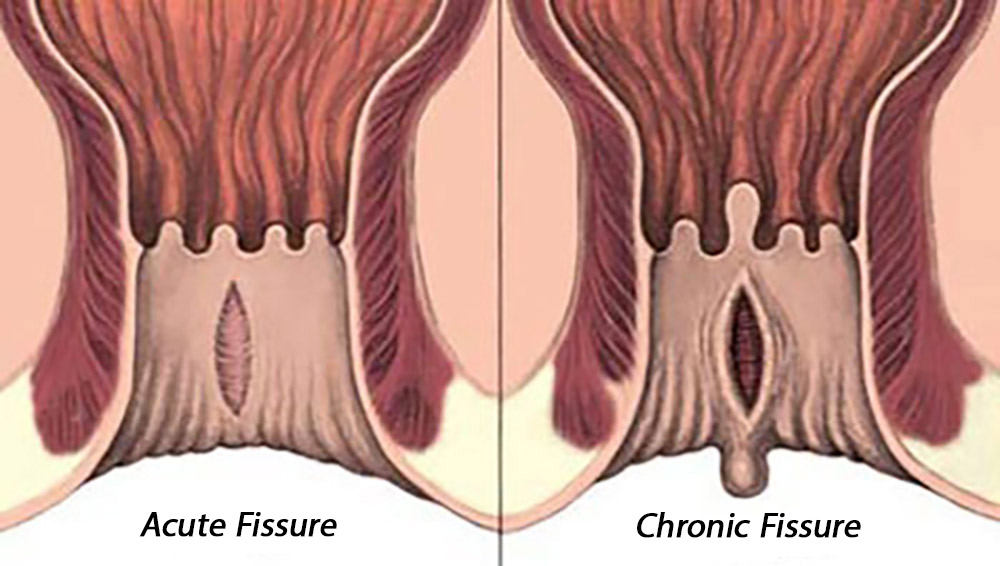
Why do anal fissures fail to heal on their own?
Most patients ask why small tears on anal mucus fail to improve on their own despite the body’s ability to regenerate minor wounds. To answer this question, it can be stated that some factors prevent the spontaneous healing of such tears and wounds. The first factor is the passage of stool through the rectum that irritates the fissure in each bowl movement. Another factor is the contraction of anal muscles that reduces blood supply to the fissure. The reduced blood circulation around the damaged tissue alters the healing process.
It is possible to improve the fissure wound by observing health practices and applying wound restoratives. Easy and smooth defecation can also facilitate the healing process. In addition, it is recommended to sit in a basin of warm water several times a day and use a medical pillow for sitting on hard surfaces.
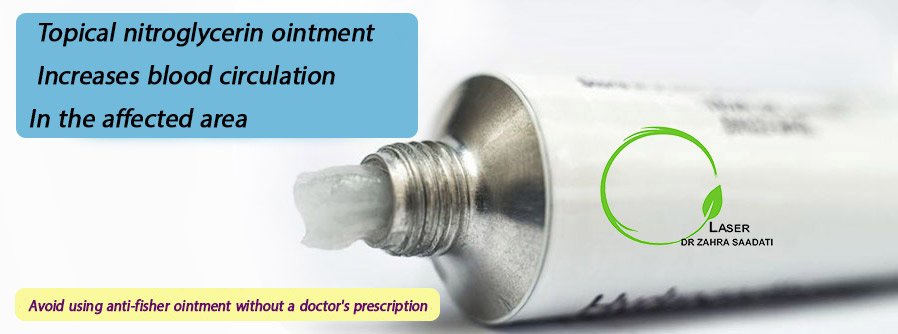
Examinations of anal fissures
Patients with an anal fissure should not be examined physically, because touching the area may worsen the condition. If necessary, the general surgeon examines such patients under local anesthesia. Different ways of examining anal fissures are as follows:
- Talking to the patient
- Reviewing ultrasound or medical images
- Visual examination
Treatment of anal fissure
There are different methods for treating anal fissures. However, treatments of fissure focus on breaking the cycle of pain, ischemia, and spasm, as the main causes of this disease. The first line of treatment is to reduce trauma or damage to the anal canal by adding more high-fiber foods, such as fruits and vegetables, to the diet and drinking water and liquids.
Sitting in a basin of warm water several times a day and taking a laxative also help to improve this disease.
Physicians usually prescribe the 2% lidocaine gel to be administered locally to reduce fissure pain. The topical nitroglycerin ointment also increases blood circulation in the affected area; however, headache is a common side effect of this ointment among patients.
Physicians believe that acute fissures can be eliminated by medical treatments, whereas most cases of chronic fissures should be treated through fissure surgery.
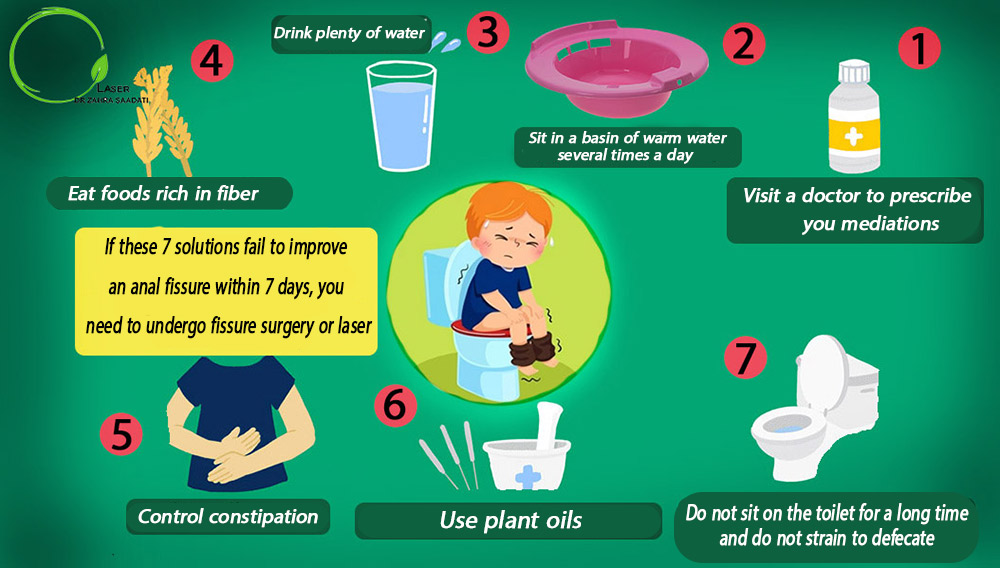
Medications that can effectively treat anal fissures are as follows:
- Glyceryl trinitrate (GTN) heals the fissure wound by dilating the blood vessels.
- Calcium channel blockers: These drugs relax the muscle and increase blood supply to the area.
- Steroid ointment: This ointment reduces anal inflammation, itching, and pain caused by fissure wound.
Botox injection as a treatment for fissures
Botox injections, which paralyze the anal muscles, are used in some medical centers as an alternative to fissure surgery. Although this method causes a few complications, it does out outperform medical treatments of anal fissures.
When medical treatments fail to produce positive therapeutic results, conventional surgery is performed to definitively treat chronic fissures. This surgery aims to reduce spasms of the internal sphincter.
Although the success rate of fissure surgery is about 95%, there is a risk of recurrence in less than 10% of patients. Another treatment for anal fissures is a local flap with or without a sphincterotomy.
Causes of anal fissure
The main causes of anal fissures include constipation, muscular spasms, pregnancy, sexually transmitted infections, Crohn’s disease, and anal sex. An acute anal fissure is also caused by a tear in the anal skin after long-term diarrhea or constipation. This tear contracts the anal internal muscles and causes severe anal pain. The main cause of a chronic anal fissure is constipation, which refers to hard and dry stool or long intervals between bowel movements.
Risk factors for anal fissures:
Constipation, Crohn’s disease, untreated hemorrhoids, pregnancy, internal examination of the anus, external objects, drinking insufficient water and liquids, insufficient physical acidity, sexually transmitted diseases, eating processed foods or fast foods, and low-fiber diets all are risk factors for anal fissures.

Surgical treatment of anal fissure
In cases where an anal fissure does not respond to medication or recurs after treatment, the next treatment option is conventional surgery (using blades and knives) or laser surgery with high-power lasers. The surgical procedure usually performed for treating an anal fissure is called sphincterotomy. About 8% of patients undergoing conventional fissure surgery suffer from anal incontinence after surgery. By contrast, laser surgery using the high-power CO2 laser minimizes the risk of postoperative complications.
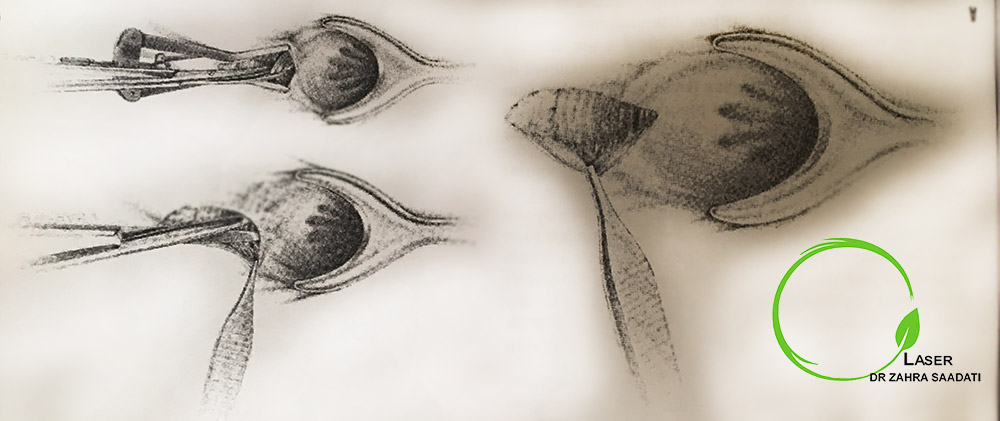
Anal fissure laser
Acute anal fissures can be treated by low-power lasers. Laser therapy can continue 2 or 3 times a week for 12 sessions. This method of fissure laser helps to heal the wound and reduce pain. Chronic anal fissures that do not respond to conservative treatments can be also treated by high-power lasers. This type of laser allows to remove an anal fissure and its skin by performing a sphincterotomy.

Radio Tehran interview with Dr. Zahra Saadati about anal fissures
Click the following link to listen to the interview of Dr. Zahra Saadati with Radio Tehran about anal fissures.
Frequently asked questions (FAQs) about anal fissures
1-Is an anal fissure a serious disease?
Anal stenosis, extra pressure on the anus, unhealthy diets, and low physical activity can delay the fissure healing. An anal fissure is not inherently dangerous and does not lead to cancer, but it is a major barrier to normal life.
2-Why do I constantly develop anal fissures?
Anal pressure and trauma are the main causes of anal fissures. In addition, constipation and slow bowel movements can lead to an anal fissure. A rare cause of anal fissures is irritable bowel syndrome (IBD).
3-What is the permanent treatment of an anal fissure?
An anal fissure can be permanently treated in a few weeks by controlling constipation, following a high-fiber diet, drinking plenty of water and juices, and sitting in a basin of warm water for 10-20 minutes several times a day, especially after defecation. The last solution relaxes and reduces tension in anal muscles and facilitates the healing process. In addition to observing the above-mentioned points, patients with an anal fissure should visit a general surgeon to continue their treatment under his/her supervision.
4-What is the immediate treatment of an anal fissure?
As soon as you suspect an anal fissure, make an appointment with a specialist. Sit in a basin of warm water after defecation and control possible diarrhea or constipation. In addition, you can apply some olive oil or coconut oil to the area to heal the fissure wound.
5-What is a chronic anal fissure?
If an anal fissure remains untreated for more than three months, it is called a chronic anal fissure. You can prevent a chronic anal fissure if you follow a healthy and proper diet in the early acute stages of the disease, avoid self-medication, and visit a specialist to prescribe you the right medications.
6-What is the best ointment for treating an anal fissure?
An experienced and proficient general surgeon can prescribe you the best ointment for treating an anal fissure after examining the anal area. Do not get drugs and anal ointments from pharmacies because the wrong medications can exacerbate your disease. In case of any sensitivity or exacerbation of symptoms, visit your physician and discontinue the medication.
7-How is it possible to treat an anal fissure with vitamin E capsules?
It is not possible to treat an anal fissure only by taking vitamin E capsules; this capsule is used to accelerate the healing of superficial wounds. To use this capsule, cut its membrane and apply the content to the wound. You can repeat it once a day for one week after cleaning and drying the area. Note that this home remedy is not enough for treating an anal fissure; it is necessary to visit a specialist to definitively treat this disease.
8-What happens if an anal fissure remains untreated?
As you know, an anal fissure creates an open wound in the highly infected area of the anus. Bowel movements make this wound more infected and increase the risk of anal abscesses. In addition, incomplete or difficult defecation due to anal spasms resulting from an anal fissure can increase the risk of hemorrhoids.
9-Does fissure heal by itself?
Fissure does not heal by itself. In the early stages of the disease, fissures may be treated by changing lifestyle and diet. But if the fissure is not treated on time, it becomes chronic and complicated. The use of strong medicine prescribed by a specialist can be very effective along with home remedies. However, if the fissure becomes complicated, surgery or laser for the fissure along with diet modification is definitely recommended.
10-Is metronidazole effective for treating fissures?
Some patients experience an infection in the anal area in addition to the fissure wound, but this is not a good reason to take metronidazole tablets to treat fissure. This pill has numerous side effects, and among the most important of them is the occurrence of constipation and defecation disorder, which is considered the enemy of fissure. Therefore, do not use this pill without a doctor’s prescription. In addition, if you have to use any type of antibiotic, be sure to increase the amount of water consumed.
